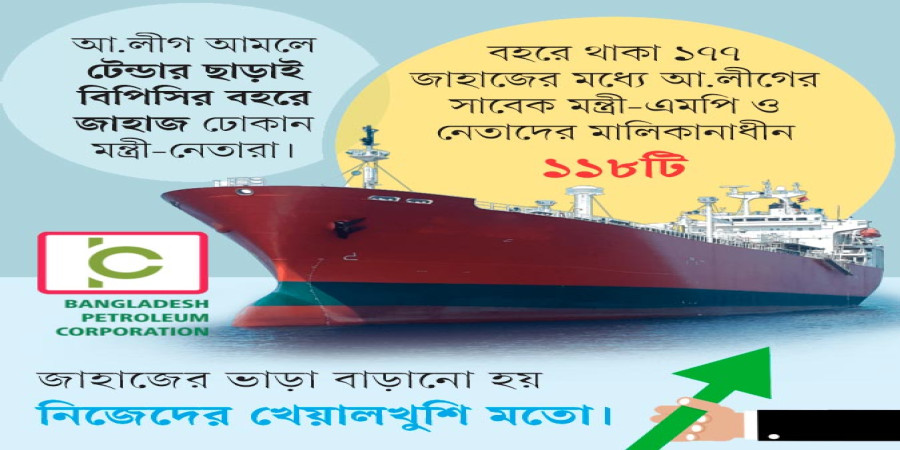
ছবি: Photo: Collected
In December 2010, during the tenure of the Awami League government, 53 oil tankers were directly added to the fleet of Bangladesh Petroleum Corporation (BPC) without any tender. Through an official directive, these vessels were incorporated into the state-owned fuel companies—Padma, Meghna, and Jamuna—for oil transportation. Notably, several of these vessels are owned by prominent Awami League leaders.
By 2024, the number of oil tankers in BPC's fleet has continued to rise. As of July 2024, records indicate that out of 177 vessels in the fleet, 118 are owned by Awami League ministers, leaders, and bureaucrats.
Official documents from BPC reveal that well-maintained Japanese oil tankers were removed from service under the pretext of being outdated, only to be replaced with locally manufactured, high-risk vessels owned by ruling party affiliates. Seventy Japanese ships were decommissioned from the fleet, citing age-related concerns, despite the absence of any legal age limit for oil tankers in the relevant regulations.
In an official letter to the Energy and Mineral Resources Division Secretary on August 8, 2023, BPC stated that its fleet consisted of 162 oil tankers, of which 143 were domestically built. The majority of these were under the ownership of Awami League leaders.
According to available data from BPC and its subsidiaries, several oil tankers are registered under the names of prominent Awami League figures. Former Home Minister Mohiuddin Khan Alamgir owns MT Anim Jalal, OT Niamat, and MT Sultana. Former Narayanganj MP Shamim Osman’s son, Imtinan Osman, owns MT C Bridge and ZN-1. Shamim Osman’s relative, Awami League leader Tofayel Kabir Khan, owns MT Rashed and MT Rida-1, among several others.
Additionally, other ruling party figures with ownership of oil tankers include former MP and ex-Prime Minister’s protocol officer Alauddin Mohammad Nasim, former Dhaka South City Mayor Fazle Noor Taposh, Taposh’s brother-in-law Hasanul Bari, Awami League leader and former Dhaka Club President KM Zaman Romel, former Noakhali-1 MP Md Ibrahim, Chattogram Metropolitan Awami League General Secretary and ex-Mayor AJM Nasir Uddin, and several others.
Mymensingh Awami League leader Engineer Mahbub Kabir, Narsingdi Awami League leader Shafiqul Amin Bhuiyan, former Inspector General of Police Benazir Ahmed, Awami League leaders Sheikh Hafizur Rahman, Khaled H Khan, and former Chattogram MP MA Latif are also named among the owners. Additionally, former Feni Upazila Chairman Mizanur Rahman and former Narsingdi MP Sirajul Islam, along with Bangladesh Petroleum Tanker Owners Association Vice President Md Wahid Mia, are also reported as owning oil tankers. Benazir Ahmed is said to have sold his tanker to a ruling party leader towards the end of the government’s tenure. Many of these individuals are either in hiding or in prison, making it difficult to obtain their statements.
BPC records confirm that former Home Minister Mohiuddin Khan Alamgir owns three tankers—MT Anim Jalal, OT Sultana, and OT Niamat—which are reportedly managed by Yamin, a relative of historian Muntasir Mamun. Shamim Osman’s two vessels, AZN-1 and C Bridge, are supervised by Kamrul, though a BNP-affiliated individual is said to be overseeing them in recent months. Awami League leader KM Zaman Romel owns two tankers, Peoples-1 and Peoples-2, which are managed by Rezaul Karim Badol. When contacted, Badol stated that Romel is currently abroad.
Tofayel Kabir Khan of Khan Group owns seven to eight oil tankers. These vessels are managed by Shamim Osman’s son, Imtinan Osman (also known as Ayon Osman), with Syed Golam Rups serving as the General Manager. Rups confirmed that their fleet includes eight oil tankers dedicated to fuel transportation.
BPC's Director of Operations, Anupam Barua, has claimed that all oil tankers in the BPC fleet were included following government policies, denying any irregularities. He further stated that no vessel older than 40 years is permitted to continue operations, citing ministry directives.
However, Bangladesh Oil Tanker Owners Association Vice President Abul Bashar Abu alleges that past government associates illegally added numerous tankers to the BPC fleet without tenders based on political affiliations, allowing them to reap financial benefits at the expense of genuine business operators.
Abu further asserted that although there is no official restriction on the age of vessels for oil transportation, former State Minister for Power Nasrul Hamid Bipu directly intervened to remove tankers older than 40 years from the BPC fleet. He claims that this decision lacked any legal basis.
Director General of the Department of Shipping, Commodore Mohammad Maksud Alam, explained that coastal tankers and ships operating under the Merchant Shipping Ordinance of 1983 are permitted to transport oil year-round. He emphasized that these merchant vessels meet global standards such as Lloyd’s Register classification and safety regulations. Under the Inland Shipping Ordinance of 1976, inland water vessels have a lifespan limitation of 30 years, but no such restriction applies to merchant or coastal oil tankers. However, according to the Inland Shipping Ordinance, inland vessels are only allowed to operate in the sea for three months, from November 15 to February 28, for fuel transportation.
Despite this, state-run fuel suppliers Padma, Meghna, and Jamuna continue using shallow draft, bay-crossing, and mini tankers for oil transport throughout the year, increasing risks.
Maksud Alam acknowledged the issue, stating that due to insufficient manpower and inspectors in his department, taking necessary enforcement actions remains a challenge.
BPC sources indicate that approximately 7 million tons of fuel oil are imported annually into Bangladesh, including diesel, jet fuel, octane, furnace oil, and various crude oil types. Of this, nearly 5 million tons are transported via river routes. Around 70% of this oil is carried by vessels owned by Awami League ministers, leaders, and bureaucrats.
Regarding this, BPC's General Manager of Operations and Commerce, Moni Lal Das, stated that BPC imports 7 million tons of fuel annually, with about 75% transported through waterways.
repoter






